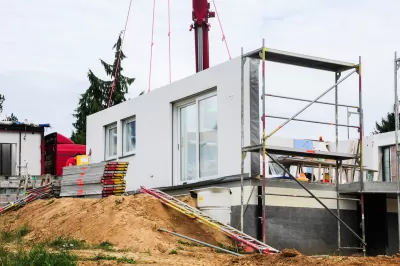Industry leaders say a national set of standards for off-site construction of modular housing would boost the affordable housing stock and make construction faster.

In an opinion piece published in Governing, Matt Belcher, chair of the National Association of Home Builders’ (NAHB) Building Systems Council, argues for reforming regulations governing prefabricated housing construction, which according to Belcher is limited by “a patchwork of state and local regulatory requirements and a lack of understanding of the off-site construction process.”
The diversity of regulations, where they exist, hinders the ability of builders to scale regionally, Belcher writes. Belcher includes a list of benefits of prefabricated, or off-site, construction, which “can deliver projects 20 to 50 percent faster than traditional methods at a cost savings of up to 20 percent” and produce less waste than traditional construction sites.
Belcher advocates for the adoption of a nationwide standard based on local and state regulations developed by Salt Lake City and Virginia, suggested by the International Code Council and Modular Building Institute. “Developed and supported by a broad cross-section of manufacturers, builders, design professionals, affordable-housing advocates and building code officials, ICC/MBI Standards 1200 and 1205 capture best practices from across the country to streamline the deployment of modular projects.”
In Belcher’s view, “Off-site construction offers a unique means to tackle the affordable-housing crisis head on. Policymakers and industry leaders must work together to remove regulatory barriers, including the patchwork application of inconsistent building standards, that are stifling its growth.”
FULL STORY: A Unique Opportunity to Address the Affordable-Housing Crisis: Off-Site Construction

Planetizen Federal Action Tracker
A weekly monitor of how Trump’s orders and actions are impacting planners and planning in America.

Maui's Vacation Rental Debate Turns Ugly
Verbal attacks, misinformation campaigns and fistfights plague a high-stakes debate to convert thousands of vacation rentals into long-term housing.

Restaurant Patios Were a Pandemic Win — Why Were They so Hard to Keep?
Social distancing requirements and changes in travel patterns prompted cities to pilot new uses for street and sidewalk space. Then it got complicated.

In California Battle of Housing vs. Environment, Housing Just Won
A new state law significantly limits the power of CEQA, an environmental review law that served as a powerful tool for blocking new development.

Boulder Eliminates Parking Minimums Citywide
Officials estimate the cost of building a single underground parking space at up to $100,000.

Orange County, Florida Adopts Largest US “Sprawl Repair” Code
The ‘Orange Code’ seeks to rectify decades of sprawl-inducing, car-oriented development.
Urban Design for Planners 1: Software Tools
This six-course series explores essential urban design concepts using open source software and equips planners with the tools they need to participate fully in the urban design process.
Planning for Universal Design
Learn the tools for implementing Universal Design in planning regulations.
Heyer Gruel & Associates PA
JM Goldson LLC
Custer County Colorado
City of Camden Redevelopment Agency
City of Astoria
Transportation Research & Education Center (TREC) at Portland State University
Jefferson Parish Government
Camden Redevelopment Agency
City of Claremont





























